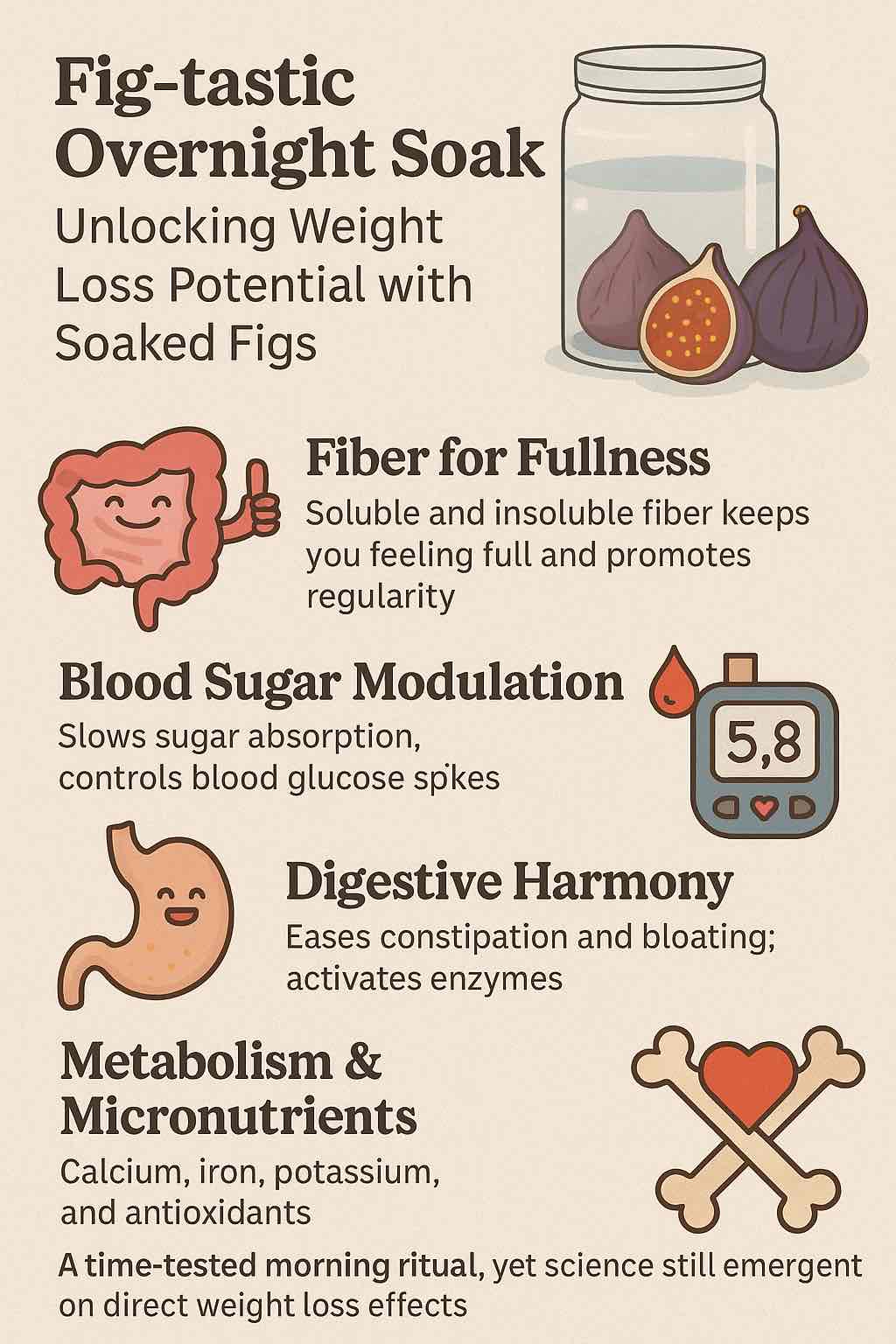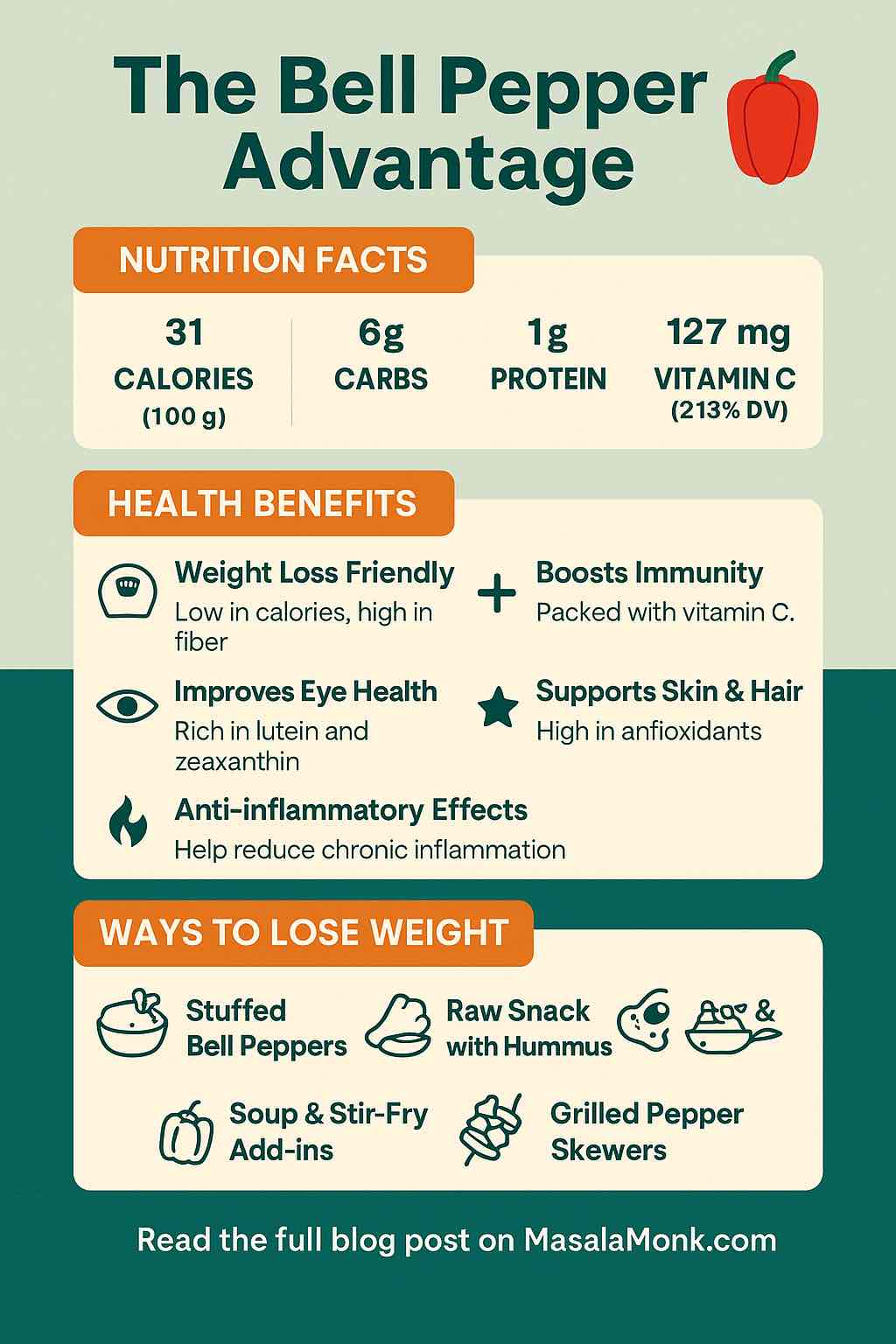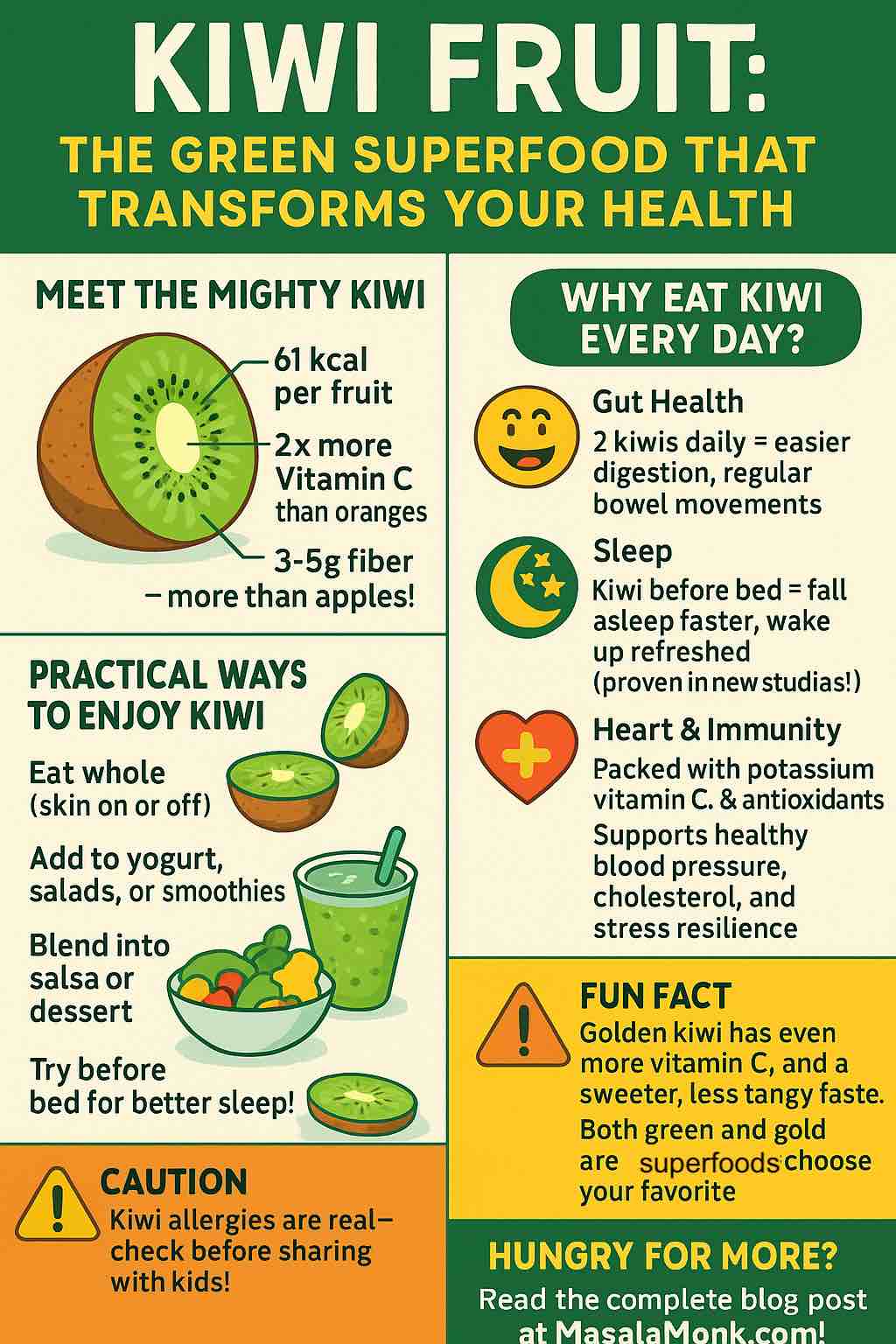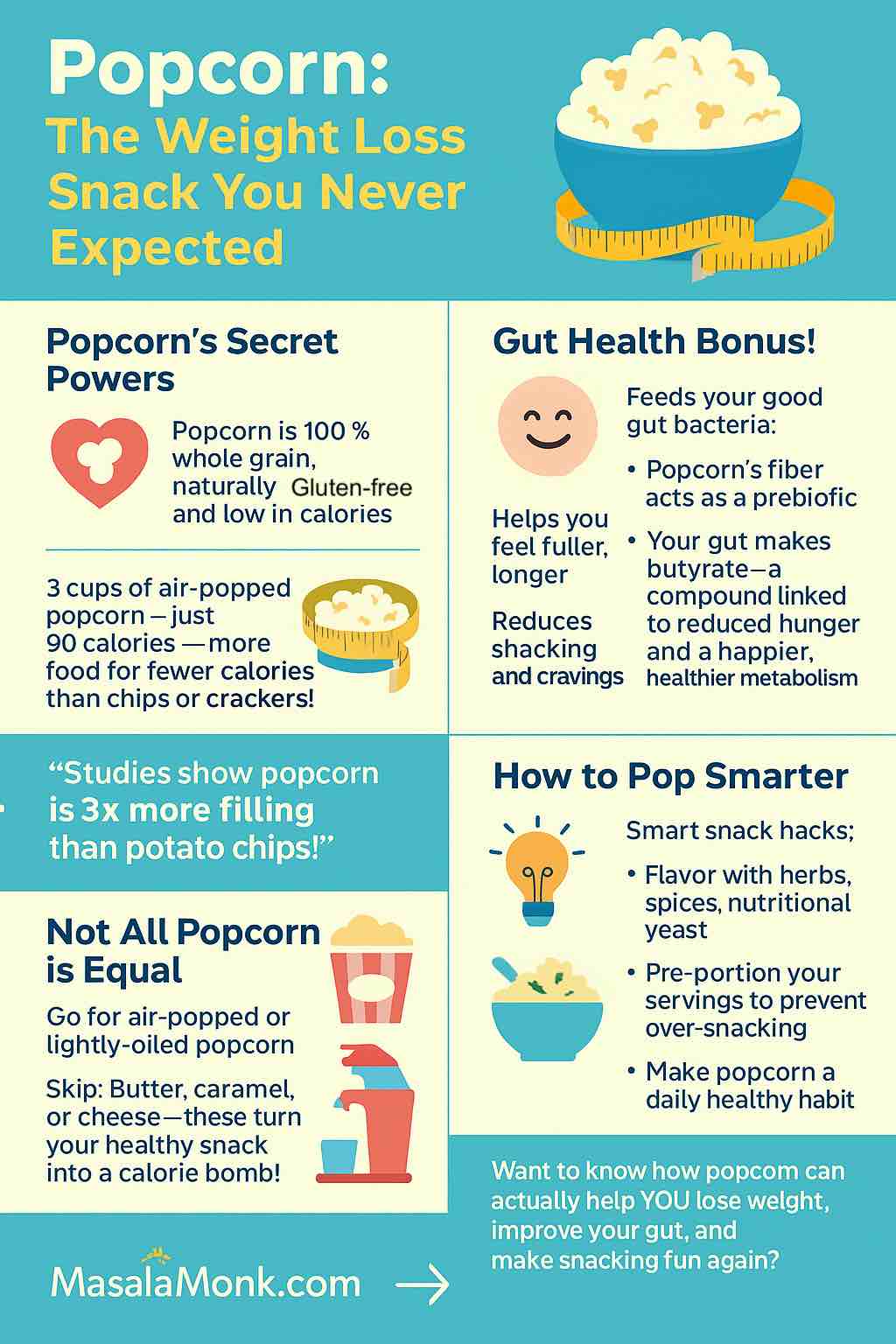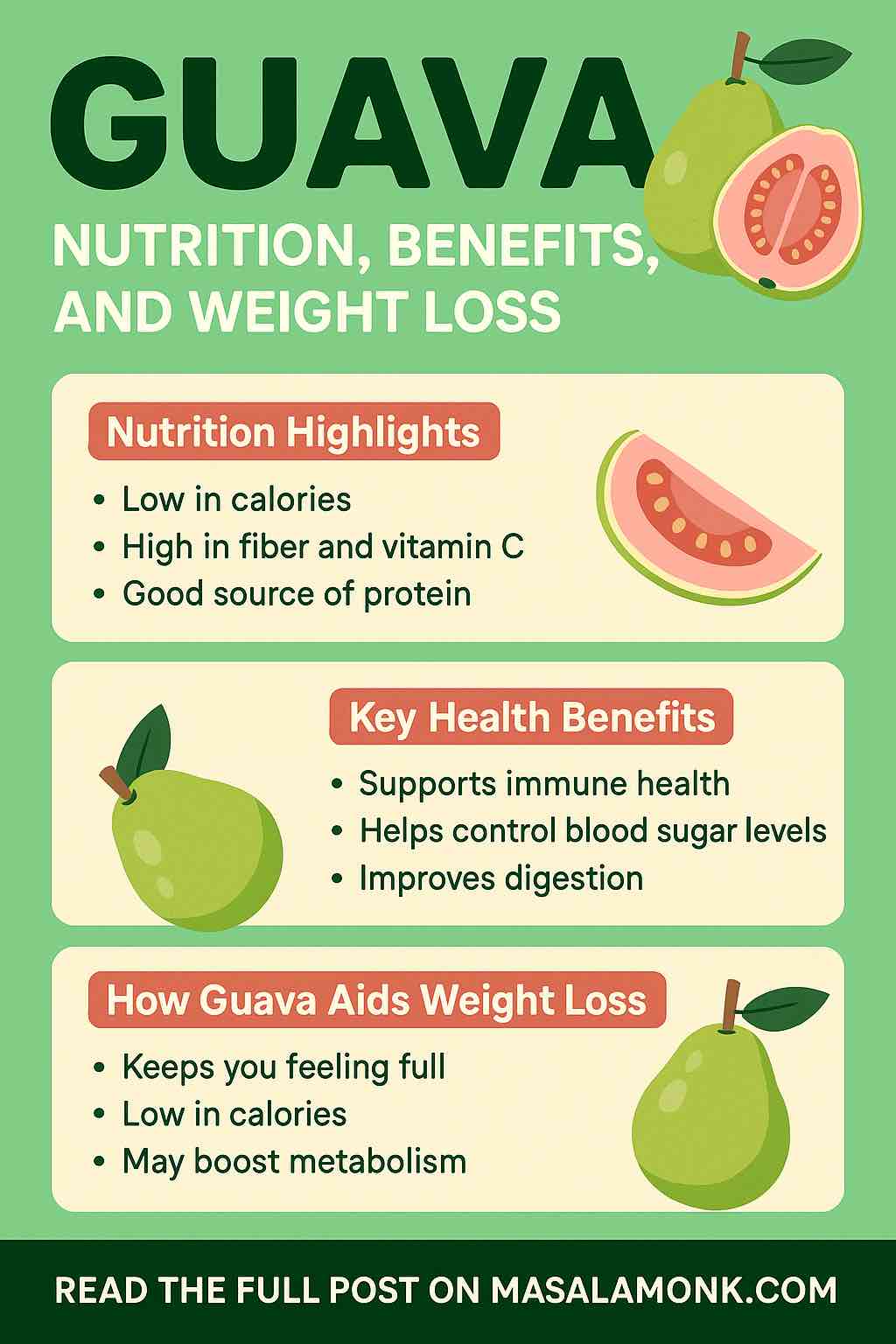
Are you tired of the same old apples and bananas in your fruit bowl? Looking for a sweet, crunchy, and powerfully healthy addition to your diet that can help with weight loss, immunity, and gut health? Meet the guava—an underappreciated tropical fruit that’s bursting with nutrients and weight-friendly benefits.
In this in-depth guide, we’ll explore:
- Guava’s full nutrition profile (backed by 2025 science)
- Proven health benefits (including real clinical findings)
- User experiences—what everyday people are saying
- 5 practical, delicious ways to add guava to your weight-loss routine
- Smart, science-backed tips to maximize the benefits and avoid pitfalls
Guava at a Glance: A Nutrition Powerhouse
Guava is one of nature’s most nutrient-dense fruits. Here’s what you get in just 1 cup (~165 g):
| Nutrient | Amount | % Daily Value (DV) |
|---|---|---|
| Calories | ~112 kcal | — |
| Fiber | 9 g | 36% |
| Protein | 4.2 g | 8% |
| Vitamin C | 377 mg | 419% |
| Potassium | 688 mg | 15% |
| Folate | 81 mcg | 20% |
| Vitamin A | 1030 IU | 21% |
| Lycopene (pink/red only) | 5200 mcg | — |
What makes guava unique?
- It has nearly 4x the vitamin C of an orange
- The highest protein content of any major fruit
- Loads of fiber—more than most vegetables
- Exceptionally low in calories and sugar, especially white-flesh guava
Why Guava? The Science-Backed Benefits
1. Supports Weight Loss—Naturally
Guava is low in calories (just 37–68 kcal per fruit), but its high fiber (3–5g per fruit) and decent protein keep you full and satisfied, reducing the urge to snack. In fact, 2025 studies confirm that guava’s fiber delays digestion and curbs appetite, making it a perfect weight loss snack.
User insight:
“Helps you in losing weight… balancing your weight and thus preventing you from getting obese.” – Reddit user, r/fruitshealthbenefits
2. Blood Sugar & Metabolic Health
Guava’s low glycemic index (GI ~15) and plant compounds help regulate blood sugar, reducing spikes after meals. Clinical trials show guava fruit or leaf tea can blunt post-meal glucose increases and even improve insulin sensitivity.
User tip:
“Guava does have a fair amount of carbs… Pair it with peanut butter or almonds to make it less harsh on your blood sugar.” – r/prediabetes
3. Heart Health, Immunity & More
Rich in potassium, vitamin C, and antioxidants, guava helps lower blood pressure, supports immune function, and protects your cells from inflammation and oxidative stress.
Guava leaf extract is even being explored for its anti-inflammatory effects in arthritis, and for cholesterol/triglyceride reduction.
4. Gut & Digestive Support
The high fiber helps maintain a healthy gut, prevent constipation, and may even feed beneficial bacteria. Some use guava or its leaves as a gentle remedy for diarrhea.
Real User Experiences: What’s It Like to Eat Guava?
- Filling snack: Most find that eating a whole guava (with seeds and skin) curbs hunger for hours.
- Blood sugar concerns: Some diabetics report a mild glucose spike when eating guava alone—best paired with healthy fats or protein.
- Leaf tea feedback:
- Some users feel an improvement in digestion and energy after adding guava leaf tea.
- A few sensitive users have reported mild stomach discomfort or nausea—so always start small!
5 Practical, Delicious Ways to Use Guava for Weight Loss
1. Eat It Whole (Raw!)
- Wash thoroughly and eat with the skin and seeds—this is where most fiber and nutrients are.
- Slice and sprinkle with a pinch of chili or black salt for an Indian-style treat.
2. Guava Salad Power Bowl
- Dice guava and combine with cucumber, tomato, cilantro, and a squeeze of lime.
- Add chickpeas or a handful of nuts for protein.
3. High-Fiber Guava Smoothie
- Blend chopped guava (don’t strain!) with Greek yogurt, spinach, and a dash of cinnamon.
- The protein/fat from yogurt helps slow sugar absorption.
4. Guava Leaf Tea
- Steep 1–2 teaspoons dried guava leaf in hot water for 10–15 min.
- Drink before meals to support blood sugar and appetite control.
- Start with ½ cup to check your tolerance.
5. Guava Salsa or Chutney
- Mix diced guava with onion, tomato, cilantro, and jalapeño.
- Use as a topping for grilled chicken, fish, or even whole-grain toast.
Pro Tips for Best Results
- Prefer white guava for weight loss: Lower sugar, higher fiber than pink.
- Stick to 1–2 medium guavas/day (or 1 cup) for most people.
- Always combine fruit with protein or healthy fats if you have blood sugar concerns.
- Try fermented guava-yogurt bowls for a gut-healthy breakfast.
- Start small with guava leaf tea/supplements—watch for digestive side effects.
Cautions & Considerations
- Too much guava (especially if you’re new to fiber) may cause bloating or gas—introduce it gradually.
- If you have diabetes or take blood sugar medications, monitor your glucose and consult your doctor before using guava leaf products.
- Commercial guava juices often contain added sugar and little fiber—choose whole fruit or minimally processed options.
The Bottom Line
Guava is one of the best fruits you can add to your weight-loss or wellness routine. It’s nutrient-packed, low in calories, rich in fiber and protein, and offers benefits far beyond just fat loss—including immunity, heart, and gut support. Real-world users and clinical trials both support its use—just remember to consume it wisely and pair it with a healthy diet.
Want to give guava a try?
Start with a fresh guava snack, blend it into your morning smoothie, or experiment with guava leaf tea. Your body (and tastebuds) will thank you!
Have you tried guava for weight loss or wellness? Share your favorite recipes or experiences in the comments below!
Frequently Asked Questions (FAQs)
1. Is guava really good for weight loss?
Yes! Guava is low in calories, very high in fiber, and contains more protein than most fruits. This combination helps keep you full longer and supports a calorie deficit, making it ideal for weight loss.
2. Which type of guava is best for weight loss: white or pink?
White-flesh guava typically has less sugar, fewer calories, and slightly more fiber than pink guava. For weight loss, white guava is the better pick, but both are healthy choices.
3. How many guavas can I eat per day for weight loss?
Generally, 1–2 medium guavas per day (or about 1 cup chopped) fits well into a balanced weight-loss diet. Eating more may cause digestive discomfort due to the high fiber.
4. Can eating guava spike my blood sugar?
Guava has a low glycemic index, so it won’t spike blood sugar for most people. However, some diabetics may experience a mild rise, especially if eaten alone. To prevent this, pair guava with protein or healthy fats.
5. Is guava safe for people with diabetes?
Guava is considered safe for diabetics, thanks to its fiber and low sugar content. If you’re on medication or monitoring glucose, start with small portions and check your blood sugar response.
6. Can guava leaf tea really help with weight loss?
Guava leaf tea may help regulate blood sugar and appetite, based on recent studies and user reports. It works best when combined with a healthy diet and active lifestyle, not as a standalone solution.
7. Are there any side effects of eating guava or using guava leaf tea?
Guava is generally safe. Eating too much can cause bloating or gas, especially for those new to high-fiber foods. Some users report mild stomach upset from guava leaf tea, so start with a small amount.
8. Is it better to eat guava with or without the skin and seeds?
For maximum fiber and nutrients, eat guava with the skin and seeds. Just wash thoroughly before eating.
9. Can I eat guava if I’m on a keto or low-carb diet?
Guava is relatively low in carbs for a fruit, but it still contains natural sugars. Most keto or low-carb dieters can fit 1 small guava into their daily plan in moderation.
10. Are processed guava juices or candies healthy?
No. Most processed guava products are high in added sugar and lack the fiber of whole fruit. For health and weight loss, choose fresh guava or minimally processed forms.

